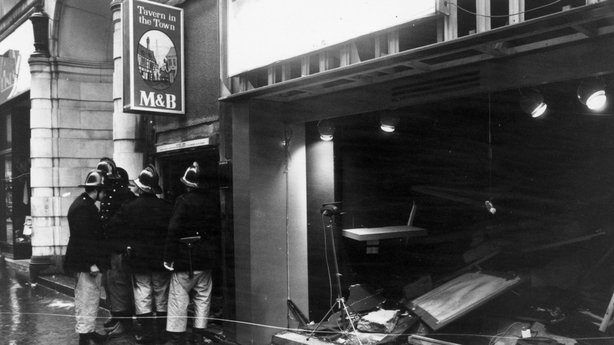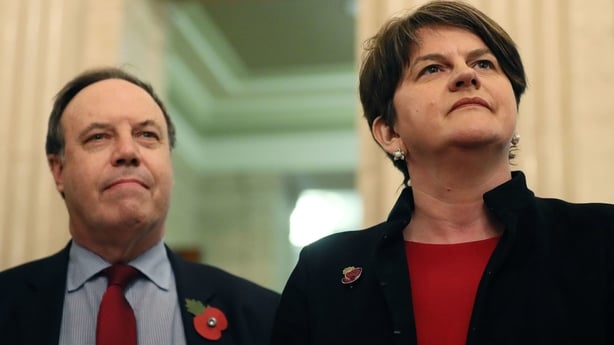The first time I realised fully that people in Britain saw Northern Ireland as different from the rest of the UK was in 1974. Roy Jenkins, the then Labour Home Secretary, introduced emergency legislation as a response to the Birmingham and Guildford bombs in October and November of that year. It was a big surprise to those of us sitting in the press gallery of the House of Commons to have such a well known liberal introducing such tough legislation.
After all, Jenkins himself called the powers under the Prevention of Terrorism Act "Draconian" and "unprecedented in peacetime". But the controversial aspect of the legislation was that it allowed people to be exiled, or excluded, from Britain to Northern Ireland and vice versa. So if you were a native of Northern Ireland, even though you were automatically a British citizen, you could be excluded from the rest of Britain. This allowed the police to keep away from mainland Britain Northern Irish people they regarded as a paramilitary threat.
I remember Jenkins being interviewed on television, uncomfortable and annoyed that this emergency legislation was destroying his reputation as a liberal. He was asked whether this system of exclusion orders wasn’t very offensive, particularly to people in Northern Ireland, treating them differently from the rest of the UK? "But they have always wanted to be treated differently", he snapped.

It was an English display of irritation with Northern Ireland, but he was right. From the very beginning, Northern was treated differently. They had a devolved assembly with wide powers when, throughout the last century, neither Scotland nor Wales had an assembly until 1999. Unionists would have preferred for all of the island of Ireland to remain part of the UK, but failing that they were determined to use their parliament with its inbuilt Protestant majority as a way of cementing partition and warding off any move by any British politician to push them into an all Ireland arrangement.
"Northern Ireland without a Parliament of her own would be a standing temptation to certain British politicians to make another bid for a final settlement with the Irish Republic", said the Ulster Unionist Council Report in 1936. It is interesting that Northern unionists have always had as healthy a scepticism about British politicians as they have towards politicians in the Republic of Ireland.
"So since there’s difference there already, why can’t the DUP accept the implied but advantageous difference in Teresa May’s proposed backstop deal?"
Indeed, a day or two after the Republic voted to repeal the anti-abortion amendment in the constitution, I heard an interesting conversation on Radio Ulster between Albin McGuinness of the SDLP and Jim Allister, the Independent Unionist. McGuinness was vowing he would resist to the end any attempt in a federal united Ireland to legalise abortion in Northern Ireland. Jim Allister was vowing that he would resist to end any attempt by a British government to legalise abortion in Northern Ireland. Conservative unionists and nationalists agreed on that on this issue at least, Northern Ireland should be different.
So since there’s difference there already, why can’t the DUP accept the implied but advantageous difference in Teresa May’s proposed backstop deal? Northern business and farmers want it. It would have allowed the North to market itself as a unique destination for foreign investment, being able to export freely into the UK and into the EU with some minimal checks on goods between the North and the UK.
Why can’t the DUP accept it? Because they’re afraid. Not only are they afraid of nationalists becoming a majority and voting for a united Ireland, they’re afraid of British betrayal. They’re afraid that anything that differentiates them from the rest of the UK will be used as an excuse to get rid of them. Most British people know little about Northern Ireland and perhaps care little about it. The North’s valiant combat record in World War 1 and World 2 is pointed to constantly by unionists as a proof of their loyalty to the union – and it was.

But the constant and passionate daily emphasis on the union and obsession with the union in Northern Ireland is not seen in too many other parts of the UK. It makes you wonder if there’s a deep insecurity in that need to proclaim so constantly one’s right to belong, a bit like a child who suspects it isn’t loved enough.
And one can’t help but feel sympathy for northerners who think like that. Because ironically, right now, despite their harsh words about Leo Varadkar, it’s not politicians in the Irish Republic that worry the DUP most.
The politicians that these citizens of Britain don’t trust right now are the British.
You can listen to Olivia's column as heard on Drivetime here:
We need your consent to load this rte-player contentWe use rte-player to manage extra content that can set cookies on your device and collect data about your activity. Please review their details and accept them to load the content.Manage Preferences







